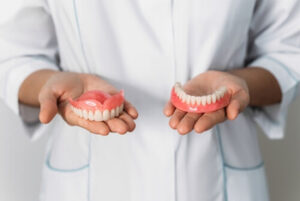Dentures can truly be life-changing. For many patients, they represent a second chance at oral health, restoring not only their ability to chew and eat comfortably but also their confidence and self-esteem. Whether you’re exploring partial dentures, complete dentures, or advanced options like implant-supported dentures, the transformation is profound. Let’s delve into the journey of before and after dentures and how they can dramatically improve your smile, quality of life, and overall oral health.
A Journey Worth Smiling About: Why Consider Dentures?
Dentures are about more than replacing teeth—they’re about restoring confidence, functionality, and quality of life. Whether you opt for traditional full dentures, modern implant-supported dentures, or partial dentures, the journey from bad teeth to a confident smile is a testament to the power of modern dentistry.
For many patients, the decision to get dentures begins with a need to address bad teeth, missing teeth, or deteriorating oral health. While it may seem daunting at first, understanding the process helps patients embrace the transformation.
Before Dentures: Facing the Challenges

Struggles with Missing or Worn Teeth
Living with missing teeth or worn natural teeth can be difficult. Chewing becomes challenging, and speaking clearly might be an issue. Many patients also experience a loss of confidence, especially in social situations, leading to a decline in their self-image.
- Chewing and Eating: Without all your front teeth or back teeth, enjoying your favourite meals becomes tough.
- Facial Muscles and Shape: Missing teeth cause the jaw bone to shrink over time, altering the shape of the face and causing a sunken appearance.
- Self-Esteem and Appearance: Gaps in the smile often make people feel self-conscious, avoiding pictures and social interactions.
The Role of Natural Teeth
For those with remaining teeth, it’s essential to consider options like partial dentures or immediate dentures to maintain balance in the mouth and preserve oral health. The presence of existing natural teeth can influence the choice of denture type.
The Transition: Getting Dentures
Transitioning to dentures is a significant step towards reclaiming your smile and oral health. From preparing your mouth to selecting the right type of denture, this process sets the foundation for a confident and functional new smile.
Consultation and Planning
Your dentist will assess your mouth, gums, and any remaining natural teeth. They will discuss options, including:
- Partial Dentures: For patients who still have natural teeth, this option works seamlessly with your existing teeth.
- Complete Dentures: Suitable for patients who’ve had all their teeth removed.
- Implant Retained Dentures: These combine the stability of dental implants with the affordability of dentures, offering a better fit and a more secure solution.
The Process: From Extraction to Final Restoration
Getting dentures is a step-by-step process, with stages including:
- Teeth Removed: If necessary, any remaining teeth are extracted to make room for the dentures.
- Healing Period: A few weeks to a few months may be required for the gums and jaw bone to heal before the final restoration.
- Immediate Dentures: For those who want to avoid being without teeth, temporary immediate dentures can be worn during healing.
- Fitting and Adjustments: Once the healing is complete, your new dentures are fitted for maximum comfort and functionality.
After Dentures: Embracing Your New Smile
Life after dentures brings newfound confidence and the freedom to smile, eat, and socialise without worry. With natural-looking dentures designed for comfort and functionality, patients can fully embrace their brighter, more youthful appearance.
A Life-Changing Transformation
The before and after dentures journey is not just about replacing teeth; it’s about regaining your life. With natural-looking dentures, you can enjoy:
- A Brighter Smile: Modern dentures are designed to create a natural-looking smile, improving your appearance and giving you a more youthful look.
- Confidence Restored: Patients often report feeling like a new person with their new smile, ready to tackle social situations with renewed self-esteem.
- Better Chewing: Functional dentures allow you to eat a wider variety of foods, improving your nutrition and overall health.
The Impact on Oral Health and Appearance
Dentures also play a crucial role in maintaining the structure of the face. By supporting the facial muscles and replacing missing teeth, they prevent the sagging appearance caused by bone loss in the jaw.
- Fixed and Implant-Supported Dentures: Options like implant-supported dentures provide a secure, long-lasting solution that feels closer to natural teeth.
- Healing and Adaptation: As your gums and mouth adjust to the dentures, any initial discomfort typically subsides, leaving you with a comfortable, functional set of teeth.
Enhancing Your Confidence with Dentures
One of the most profound effects of dentures is the boost to confidence. Living with gaps in your smile or struggling with worn teeth often impacts how you interact with others. After getting new dentures, many patients report a significant improvement in their overall mood, willingness to socialise, and even their professional lives.
- Social Comfort: You can smile freely in photos, laugh openly with friends, and enjoy meals without hesitation.
- Professional Presence: A confident smile can leave a lasting impression during job interviews, presentations, or client meetings.
- Self-Esteem: Feeling good about your appearance contributes to a healthier self-image, which radiates positivity in all areas of life.
Eating Made Easy
For many, the most immediate benefit of wearing dentures is regaining the ability to eat comfortably. Missing or damaged teeth limit food choices, often leading to a restricted diet. With properly fitted dentures, you can enjoy a wide variety of foods again.
- Chewing Efficiency: Whether it’s crunchy vegetables, chewy meats, or crusty bread, dentures restore your ability to chew effectively.
- Improved Nutrition: Being able to eat a balanced diet supports overall health, energy levels, and well-being.
- Freedom to Indulge: Enjoying meals with friends and family becomes a pleasure again, free from worries about discomfort or embarrassment.
Dentures: A Customised Solution

- Upper and Lower Dentures: Customised to fit the top and bottom arches of your mouth.
- Complete Dentures: A full set for those who’ve lost all their teeth.
- Partial Dentures: Ideal for replacing missing teeth while preserving existing natural teeth.
- Implant Retained Dentures: For those seeking stability and a natural-looking result.
The Role of Implant-Supported Dentures
For those looking for a more secure and natural-feeling option, implant-supported dentures are a game-changer. These dentures are anchored to dental implants, providing stability and durability that traditional dentures can’t match.
- Better Fit: Implants eliminate the slipping or shifting that can occur with traditional dentures.
- Bone Preservation: By stimulating the jaw bone, implants help prevent bone loss and maintain the natural shape of your face.
- Long-Lasting Solution: With proper care, implant-supported dentures can last for decades.
Maintaining Your New Smile
To keep your dentures in top shape, follow these tips:
- Proper Cleaning: Brush your dentures daily to remove plaque and prevent staining.
- Regular Check-Ups: Visit your dentist for adjustments to ensure a better fit and address any issues with wear.
- Handle with Care: Avoid dropping your dentures, as they can chip or break.
Comparing Dentures and Alternatives
While dentures are an excellent solution for many, it’s worth considering alternatives like dental implants or bridges for specific cases. Here’s a quick comparison:
- Dentures: Affordable, versatile, and customisable. Ideal for replacing multiple teeth.
- Dental Implants: A permanent solution that offers a natural feel but comes at a higher cost.
- Bridges: Best for replacing one or two teeth when natural teeth remain to anchor the restoration.
Your dentist will guide you through the options, helping you choose what’s best for your needs.
Smile Gallery: Real Transformations
From bad teeth to a brighter smile, the transformation of before and after dentures is nothing short of remarkable. Many patients describe the change as “life-changing,” with the final result exceeding their expectations.
Life with Dentures: Tips for Long-Term Success
Living with dentures requires a bit of maintenance and care to ensure they remain comfortable and effective. Here’s how to keep them in great shape:
- Clean Daily: Use a soft brush and denture cleanser to remove food particles and plaque.
- Stay Hydrated: Dry mouth can make dentures uncomfortable, so drink plenty of water.
- Handle with Care: Avoid dropping your dentures, as they can crack or break.
- Visit Your Dentist Regularly: Regular check-ups ensure a better fit and long-term health for your gums and jaw bone.
Choosing the Right Dental Provider
The success of your dentures depends on the expertise of your dentist. Look for a provider with a proven track record, excellent patient reviews, and a welcoming environment. Many clinics offer a smile gallery showcasing real patient transformations, which can help you visualise your potential new smile.
Common Questions About Dentures: Overcoming Common Concerns
It’s natural to have questions and concerns about getting dentures, from their appearance to the adjustment process. Addressing these worries can help ease the transition and ensure you feel confident and informed every step of the way.
How Long Do Dentures Last?
With proper care, dentures typically last 5–10 years. Regular check-ups ensure they remain a better fit as your mouth changes over time.
Can I Sleep with Dentures?
While it’s possible to sleep with dentures, removing them at night allows your gums to rest and promotes better oral hygiene.
Are Dentures Suitable for Younger Patients?
While commonly associated with older adults, dentures can be life-changing for younger patients who have lost teeth due to accidents, medical conditions, or genetic factors.
Will Dentures Look Natural?
Modern dentistry ensures that dentures are crafted to resemble natural teeth, matching the colour, shape, and size to create a natural-looking smile. Advances in materials and design mean that natural-looking dentures are now the standard.
How to Adjust to New Dentures?
Adapting to dentures takes time, but with patience and the support of your dentist, you’ll soon feel comfortable. For many patients, the adjustment period involves learning to speak clearly, eat without discomfort, and manage minor irritation as the gums heal.
Final Restoration: A Life-Changing Experience

A New Chapter Awaits
Dentures are more than just a replacement for missing teeth—they’re a gateway to a better fit for your life. From restoring function to boosting confidence, the transformation is undeniable. If you’re ready to experience the life-changing benefits of dentures, contact Dental 266 at 02 9051 0600 for an evaluation and take the first step toward a brighter smile.
References:
- Colgate. (n.d.). Implant-supported denture. Retrieved from https://www.colgate.com/en-us/oral-health/dentures/implant-supported-denture
- WebMD. (n.d.). Dentures: Types (partial and complete), cost, cleaning, and more. Retrieved from https://www.webmd.com/oral-health/dental-health-dentures
- Cleveland Clinic. (n.d.). Tooth extraction. Retrieved from https://my.clevelandclinic.org/health/treatments/22120-tooth-extraction
- Healthline. (n.d.). What causes sunken cheeks and how to treat them. Retrieved from https://www.healthline.com/health/sunken-cheeks#:~:text=Sunken%20cheeks%20occur%20when%20you,you%20to%20lose%20facial%20fat






